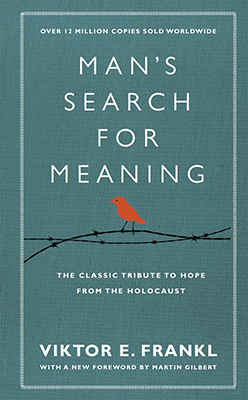Man’s Search For Meaning
“Man’s Search for Meaning” is a profound book by Viktor E. Frankl, originally published in 1946. It is divided into two parts: a personal memoir of Frankl’s experiences as a prisoner in Nazi concentration camps during World War II, and an exploration of his psychotherapeutic method known as logotherapy. Here’s a summary of the key themes and insights from the book:
Personal Memoir
Frankl begins by recounting his harrowing experiences as a prisoner in Auschwitz and other concentration camps. He describes the brutal conditions, constant suffering, and dehumanization that he and other prisoners endured. Despite these extreme circumstances, Frankl observes how individuals responded differently to their plight, from resignation to acts of kindness and selflessness.
Search for Meaning
Central to Frankl’s narrative is the idea that even in the most dire situations, individuals can find meaning and purpose in their lives. He argues that those who survived the camps often had a strong sense of purpose or a reason to live, whether it was to reunite with loved ones, pursue unfinished goals, or maintain a spiritual connection.
Logotherapy
Frankl introduces his psychotherapeutic approach, logotherapy, which focuses on helping individuals find meaning in their lives. Unlike other schools of psychology that emphasize the pursuit of pleasure or power, logotherapy posits that the primary drive in humans is the search for meaning. Frankl illustrates how this approach helped him and others cope with suffering and maintain their mental resilience.
Freedom of Choice
One of the key insights of the book is Frankl’s emphasis on human freedom and the ability to choose one’s attitude in any given circumstance. Despite the external conditions imposed upon them, Frankl argues that individuals always retain the freedom to choose how they respond to those conditions. This inner freedom, he suggests, is crucial in finding meaning and maintaining mental and emotional well-being.
Spiritual and Existential Reflections
Frankl integrates philosophical and existential reflections throughout the book, drawing on his own experiences and observations to explore deeper questions about suffering, death, and the human spirit. He emphasizes the importance of facing life’s challenges with courage and resilience, guided by a sense of meaning and purpose.
Legacy and Impact
“Man’s Search for Meaning” has had a profound impact worldwide, influencing fields beyond psychology, including philosophy, spirituality, and self-help literature. It continues to resonate with readers as a testament to the resilience of the human spirit and a source of inspiration for finding meaning in life’s struggles.
Conclusion
In conclusion, Viktor Frankl’s “Man’s Search for Meaning” is a timeless exploration of human resilience, the quest for meaning, and the triumph of the human spirit in the face of suffering. Through his personal story and therapeutic insights, Frankl offers profound wisdom on how individuals can find purpose and inner strength even in the most challenging circumstances.

